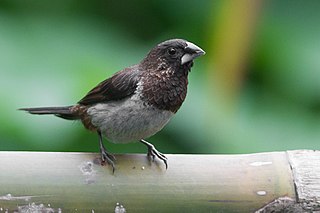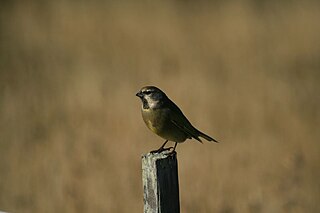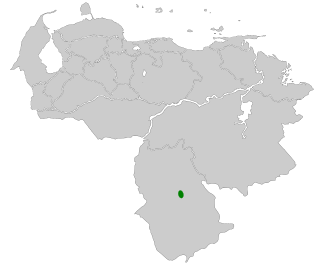
Ploceidae is a family of small passerine birds, many of which are called weavers, weaverbirds, weaver finches, or bishops. These names come from the nests of intricately woven vegetation created by birds in this family. In most recent classifications, the Ploceidae are a clade that excludes some birds that have historically been placed in the family, such as some of the sparrows, but which includes the monotypic subfamily Amblyospizinae. The family is believed to have originated in the mid-Miocene. All birds of the Ploceidae are native to the Old World, most in Africa south of the Sahara, though a few live in tropical areas of Asia. A few species have been introduced outside their native range.

The purple finch is a bird in the finch family, Fringillidae. It breeds in the northern United States, southern Canada, and the west coast of North America.

The white-rumped munia or white-rumped mannikin, sometimes called striated finch in aviculture, is a small passerine bird from the family of waxbill "finches" (Estrildidae). These are not close relatives of the true finches (Fringillidae) or true sparrows (Passeridae).

The double-barred finch is an estrildid finch found in dry savannah, tropical (lowland) dry grassland and shrubland habitats in northern and eastern Australia. It is sometimes referred to as Bicheno's finch or as the owl finch, the latter of which owing to the dark ring of feathers around the face. It is the only species placed in the genus Stizoptera .

The Gouldian finch, also known as the Gould's finch or the rainbow finch, is a colourful passerine bird that is native to Australia.

The black-faced grassquit is a small bird. It is recognized as a tanager closely related to Darwin's finches. It breeds in the West Indies except Cuba, on Tobago but not Trinidad, and along the northern coasts of Colombia and Venezuela.

The red avadavat, red munia or strawberry finch, is a sparrow-sized bird of the family Estrildidae. It is found in the open fields and grasslands of tropical Asia and is popular as a cage bird due to the colourful plumage of the males in their breeding season. It breeds in the Indian Subcontinent in the monsoon season. The species name of amandava and the common name of avadavat are derived from the city of Ahmedabad in Gujarat, India, from where these birds were exported into the pet trade in former times.

The painted finch is a common species of estrildid finch found in Australia. The painted finch acquired its name due to the red and white spotted and mottled underparts of both males and females. The binomial comes from emblema meaning 'mosaic or inlaid work'; and pictum derives from the Latin word pictus, meaning 'painted'. Other names include Emblema finch, mountain finch, painted firetail and Emblema. The painted finch is a popular bird to be kept in captivity and in backyard aviaries.

The star finch is a seed-eating bird species found in northern Australia. It has a distinctive red face and bill, and broad white spots down its flanks. One of its three subspecies may be extinct.

The white-bridled finch, also known as the canary-winged finch or black-throated finch, is a small passerine bird belonging to the genus Melanodera together with the yellow-bridled finch. Formerly placed in the family Emberizidae, it is now considered a tanager. It is found in grassland in southernmost South America. There are two subspecies: M. m. melanodera in the Falkland Islands and M. m. princetoniana in southern Argentina and Chile.

Emberizoides is a small genus of finch-like tanagers found in grassy areas in Central and South America.

Williams's lark is a species of lark in the family Alaudidae. Discovered in 1955, much of its life and ecology is still a mystery to ornithology.

Fischer's sparrow-lark or Fischer's finch-lark is a species of passerine bird in the family Alaudidae. It is found from central Kenya to eastern Zambia, Malawi and north-western Mozambique. Its natural habitat is subtropical or tropical dry lowland grassland.

The cuckoo-finch, also known as the parasitic weaver or cuckoo weaver, is a small passerine bird now placed in the family Viduidae with the indigobirds and whydahs. It occurs in grassland in Africa south of the Sahara. The male is mainly yellow and green while the female is buff with dark streaks. They lay their eggs in the nests of other birds.

The black-masked finch is a species of South American bird in the tanager family Thraupidae. It is the only member of the genus Coryphaspiza. It is found in Argentina, Bolivia, Brazil, Paraguay, and Peru. Its natural habitats are subtropical or tropical moist shrubland, subtropical or tropical dry lowland grassland, and subtropical or tropical seasonally wet or flooded lowland grassland. It is threatened by habitat loss.

The glacier finch, also known as the white-winged diuca finch and glacier bird, is a species of bird in the tanager family Thraupidae.

The Duida grass finch is a species of bird in the family Thraupidae.

The wedge-tailed grass finch is a species of bird in the family Thraupidae; it was formerly placed in the Emberizidae. It is found in Argentina, Bolivia, Brazil, Colombia, Costa Rica, Ecuador, French Guiana, Guyana, Panama, Paraguay, Peru, Suriname, Uruguay, and Venezuela.

The Inaccessible Island finch, also known as the Inaccessible bunting, is a species of bird in the family Thraupidae.

Duida–Marahuaca National Park is a protected area in Amazonas state, Venezuela. It has an area of 210,000 ha, and includes the Duida–Marahuaca Massif.






















